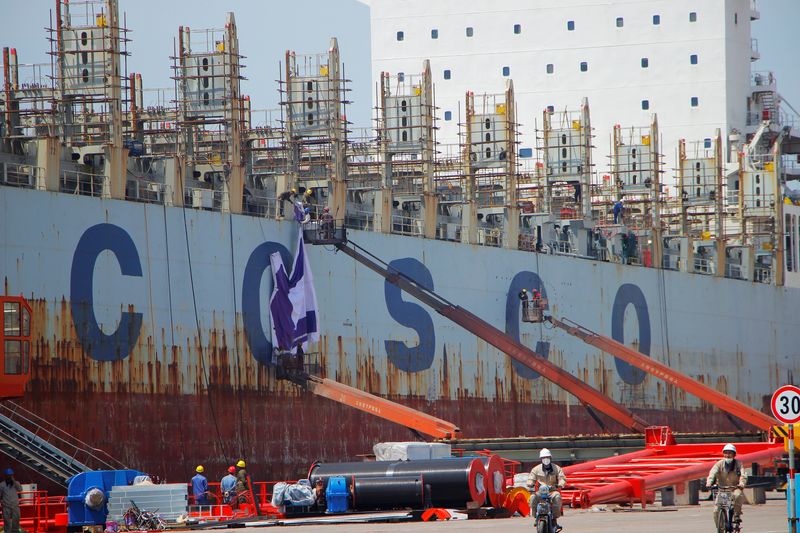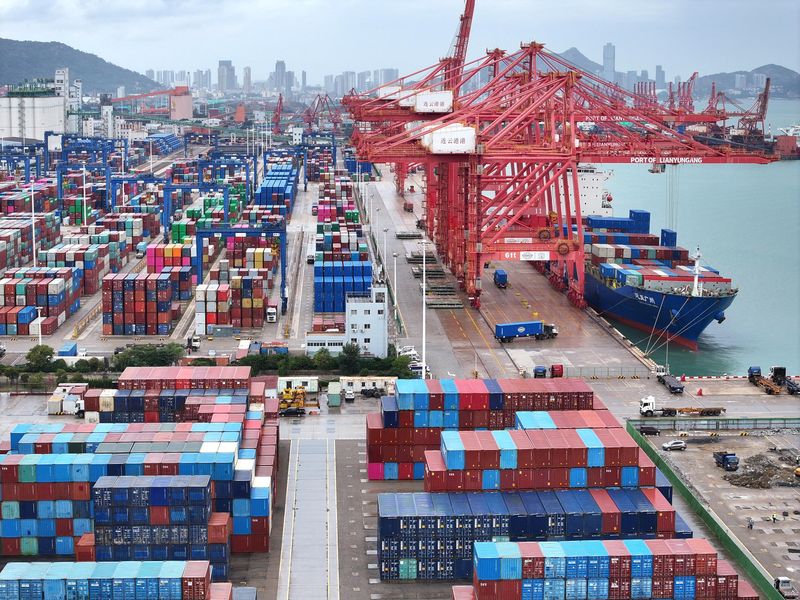By Andrea Shalal
WASHINGTON (Reuters) - U.S. President Joe Biden's administration has concluded that China uses unfair policies and practices to dominate the global maritime, logistics and shipbuilding sectors, three sources familiar with the results of a months-long trade investigation told Reuters.
U.S. Trade Representative (USTR) Katherine Tai launched the probe in April 2024 at the request of the United Steelworkers and four other U.S. unions under Section 301 of the Trade Act of 1974, which allows the U.S. to penalize foreign countries that engage in acts that are "unjustifiable" or "unreasonable," or burden U.S. commerce.
Investigators concluded that China targeted the shipbuilding and maritime industry for dominance, using financial support, barriers for foreign firms, forced technology transfer and intellectual property theft and procurement policies to give its shipbuilding and maritime industry an advantage, said one of the sources, who was not authorized to speak publicly.
Beijing also "severely and artificially suppressed China's labor costs in the maritime, shipbuilding and logistics sectors," that person added, citing excerpts of the report.
No immediate comment was available from USTR, the White House or the transition team of President-elect Donald Trump. Chinese officials were not immediately available for comment.
The probe cites data showing that China's share of the $150 billion global shipbuilding industry has expanded to over 50% in 2023 from around 5% in 2000, largely aided by government subsidies, while once dominant U.S. shipbuilders have seen their share dwindle below 1%. South Korea and Japan are the next biggest shipbuilders.
The report provides a fresh cudgel for the incoming administration to hammer China, and could pave the way for tariffs or port fees on Chinese-built vessels, as proposed by the unions. Such a move would likely come after a public comment period, they said.
Trump used the same Section 301 statute to impose tariffs on hundreds of billions of dollars of Chinese imports during his first term after a USTR investigation found China was misappropriating U.S intellectual property and coercing the transfer of U.S. technology to Chinese firms.
USTR will release its findings later this week, days before Biden, a Democrat, leaves office on Jan. 20, said the sources.
The report comes on the heels of sharp criticism from the U.S. and other Western powers of China's aggressive industrial policies and over-production of commodities like steel, and reflects rare bipartisan agreement about the need to fix U.S. shipbuilding. China denies any wrongdoing.
The report follows four years of efforts by the Biden administration to reduce China's dominance by continuing Trump-era tariffs, adding new ones, including on electric vehicles, and imposing a range of export controls.
Tai's office last month announced a last-minute trade investigation into older Chinese-made "legacy" semiconductors that could heap more U.S. tariffs on chips from China that power everyday goods from autos to washing machines to telecoms gear.
Experts agree that rebuilding the once vibrant U.S. shipbuilding and maritime industry will take decades and cost tens of billions of dollars. Tariffs alone will not suffice, they said.
"China's targeting of the maritime, logistics and shipbuilding sectors for dominance is the greatest barrier to the revitalization of U.S. industries in these sectors," the report concludes, according to an excerpt shared with Reuters.
Scott Paul, president of the American Alliance for Manufacturing, a nonprofit labor-business partnership, said he understood that the findings were compelling.
"My understanding is that ... a process will be laid out to try to stop the erosion of our shipbuilding industrial base and to start it growing again," he said.
Trump, who has said he will increase tariffs on Chinese goods to 60%, last week blasted its moves to dominate commercial and military shipbuilding, telling radio host Hugh Hewitt that the U.S. had "suffered tremendously" and needed to shift course.
He also suggested that the U.S. might have to turn to allies to build needed naval vessels for the U.S. military.
Trump's incoming national security adviser Mike Waltz has also been deeply engaged on the issue, drafting a bipartisan bill with Democratic Senator Mark Kelly to revitalize the U.S. shipbuilding industry before he resigned from Congress.

"We're way too dependent on China in particular. We do not have surge capacity. We have very little shipbuilding capacity, and for a superpower that's completely unacceptable," Paul said.
The U.S. now has just 20 public and private shipyards down from over 300 American shipyards in the early 1980s. Experts say demand is strong and growing for civilian and military vessels.
